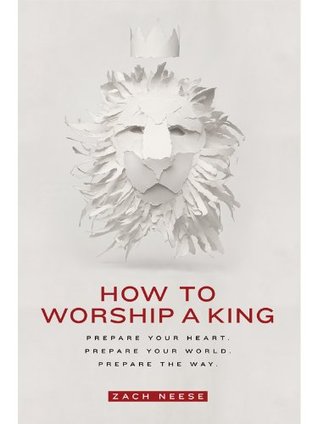 |
| Image Credit: goodreads.com |
Rating: 2.5 of 5 stars
I read this book as part of a worship study at the church I attended, and it's been very difficult for me to attempt this review because I don't want the greater message to be lost in my review of how this important content was delivered. Everything I write, and especially this review, is written through my perspective as a Bible-based Christian.
The author, Zach Neese, is the worship pastor at Gateway Church in Texas. I have no doubt he is a well-read believer. There was a plethora of inspirational passages that created revelations for me in this book. Discussing portions of it with my small group was also helpful. However, much of the book was tainted by some egotistical, short-sighted, and down-right ugly commentary.
As a Christian, I understand we falter. That is the key that is often misunderstood by non-believers. Being a Christian does not make one perfect but rather makes one forgiven and redeemed for one's shortcomings. However, I just don't see how some of the language was left in this book after the writing and editing process. Some of this language included:
From page 45: Yes, every voice should sing to God, but only the best voices should leading the singing.
As with most books like this, Neese offers some personal anecdotes. On page 47 he shares some information about fellow students at a Christian college who
"took him on as a challenge" before he was saved. He writes,
"They (the students)
had two problems: they didn't know their Bibles well enough, and they didn't have the Spirit of God. I ate them for lunch."
My first issue here is in Neese's post-saved, redeemed life he would describe his response as
"eating them for lunch." It reeks of an over-inflated ego, and it is my personal belief that it could have been worded better. It wasn't that he ate them for lunch; he was being disobedient. The way he crafted the story, it made the believers look weak, and I didn't think that was a fair assessment of the situation. We are called to go and make disciples, and that's what they were trying to do.
In chapter 4, Neese attempts an analogy about hypothetical wait service he and his wife might receive at a restaurant with putting our focus solely on God. He comments:
And Christ is one fellow you don't want to compete with. Let's make this personal. I have a beautiful wife. When I take her to dinner, it is because I want to spend time with her, not because I want her to be entertained by a waiter. This is a warning to waiters - if you want a tip, serve us; don't try to entertain us. I don't need a jester at my table; I need my glass refilled (p. 61).
Again, just the pure ugliness of this statement resulted in a loss of credibility with the author. These are not words of love, and they eroded his thesis rather than strengthening it.
From page 70, Neese drives home the point that we must demonstrate our love for God. While I do not disagree with this, as a communicator when he furthered his statement by writing,
"As the saying goes, words are cheap," he lost me. No, they are not. Sticks and stones do break bones. Words do hurt. And yes, Mr. Neese, words have great power.
On the next page, Neese distracts with:
I have no idea why they call the thing they do to your fingers a manicure. It should be called a "womanicure." All I wanted was something that shoots, cuts, or blows up. I'm a boy!
This is immature and sexist. Neese is a smart man. I can tell by the amount of research that was put into this book. I'm sure he knows the "man" part of manicure comes from the process dealing with the hand, and has nothing to do with gender. Why add this bit and take away from illustrating God's Word and the purpose of worship?
In chapter six,
What is Praise?, Neese talks about people making excuses for not honoring God. He writes,
"Why are people always looking for the exception? Why do some people look for a way to do as little as possible to honor God? The answer is simple. Those people don't love Jesus very much.
Oh, Mr. Neese, why are you hurting (with your words that DO have power) already hurt people? I do not think passing judgement is in line with God. Instead God wants us to love His people. And really that was my prevailing issue with this book that had so much potential. Neese focused on beating people up rather than building them up in what they should do and what they can do through worshipping and loving the true and living God. I think this happens often, in churches all over the world. It's part of the reason so many people are leaving the Church.
Also, in chapter six, Neese resorts to name calling describing people as
"whiney brats." On page 104, he passively passes judgments on churches who don't use instruments to worship saying,
"And, just in case your denominational culture frowns on the use of instruments, notice they used instruments to praise the Lord." (2 Chronicles 20:27-28). Bashing other denominations does not glorify God, it makes the author look petty, and, in reading it, it chipped away at his credibility with me.
Later in chapter six on page 108, Neese attempts to emulate a Spanish-speakers accent. I found this distracting and disrespectful.
In chapter nine on page 148, Neese returns to name calling by describing a neighbor as a
"spoiled brat."
I could go on, but I think these examples demonstrate my main point. I did finish the book because I try to finish what I start, and I wanted to fully participate with my small group. Additionally, I don't want to do in this review exactly what I am accusing the writer of doing.
How to Worship a King was published in 2015. I hope Neese has grown and matured (and continues to do so) since that time. There were great nuggets of truth in this book. If you follow me on social media, I shared some of those nuggets over the weeks that I read the book. My physical copy is tattered with
"Amens" and
"I <3 this!" but the overwhelmingly negative comments are what stuck with me because they were so harsh. Furthermore, they took away from the good intent I believe the author had when writing the book.
In closing, I will share this positive thing I took away:
God didn't create me to use me but instead to know me.
And from that I must grow my relationship with Him to truly worship Him (p. 3, 26). My prayer is the Neese continues to know the Lord and hone his words ... and that's my prayer for me too!
Recommendation: Perhaps, I've become too accustomed to Proverbs 31 Ministries and the less abrasive approach these women of God take on when facilitating Bible studies. As you can glean, this was book was not a favorite. I am aware we have to discuss difficult issues in the Church, and it's not all nice and neat, but I do think that the author of this book would have better served those wishing to learn about worship if he would have expressed his concerns through a veil of love. With anything, we do
not have to be disagreeable to disagree.
Bottom line: If I participated in another study on this topic, I would not choose this book to help guide discussions.
Until next time ... Read on!




















